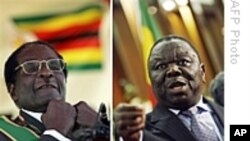Zimbabwean Prime minister Morgan Tsvangirai departed Harare on Friday for South Africa en route to Windhoek, Namibia, where the Southern African Development Community’s troika on politics, defense and security is to meet on Sunday to examine the condition of Zimbabwe's long-troubled national unity government.
Mr. Tsvangirai's formation of the Movement for Democratic Change said the regional bloc in its summit beginning on Monday, August 16, in Windhoek, must strengthen its hand in dealing with an "intransigent" ZANU-PF party.
The party said Zimbabweans expect SADC to find lasting solutions to the outstanding issues which have hobbled the unity government since its formation in February 2009 based on a 2008 Global Political Agreement.
Tsvangirai MDC spokesman Nelson Chamisa said the party urges SADC to draw up a clear roadmap to free and fair elections and to deploy a SADC monitoring force from six months before elections until six months after balloting.
It was unclear whether President Robert Mugabe, who has been on a state visit to China, would make it to Windhoek in time to take part in the SADC troika discussions on Sunday.
In Harare, meanwhile, political tensions were on the rise as Police Commissioner General Augustine Chihuri demanded a reversal of electoral reforms intended to ensure new elections in Zimbabwe will be free and fair.
The Zimbabwe Independent weekly newspaper reported that Chihuri said police should be allowed in polling stations and that postal votes should be accepted for up to a month, not two days as proposed in reform legislation drafted by the attorney general. The three governing parties have agreed the changes among other electoral reforms.
The Independent quoted Chihuri as writing in a letter: “We have had occasion to go through the electoral amendment bill and note with concern that it proposed to remove police personnel from the enjoyment of the postal ballot, as is the current position, as well as kick out police presence from the polling station." The newspaper said Chihuri maintained that restricting police access will increase insecurity and undermine election integrity.
"It is our submission as an organization that the proposed changes to the electoral act as spelt out in the bill leave the nation at the height of vulnerability,” the Independent quoted Chihuri as writing.
Chihuri recommended two police officers be stationed inside polling places, and urged that police officers be allowed to continue voting by mail. Critics say postal voting allows undue influence on how officers vote. During the 2008 presidential runoff election, a prison officer secretly filmed the procedure by which their votes were coerced.
VOA was unable to reach Chihuri or Zimbabwe Republic Police spokesman Wyane Bvudzijena for comment.
Zimbabwean civil society groups led by the Crisis in Zimbabwe Coalition are urging SADC to draw up plans to prevent state-sponsored violence in the elections many believe could be held some time next year.
The civic groups want SADC to ensure that Zimbabwe fully complies with SADC principles and guidelines governing democratic elections – including impartiality of electoral institutions.
Irene Petras, director of the Zimbabwe Lawyers for Human Rights, said Chihuri's demands are worrisome.





